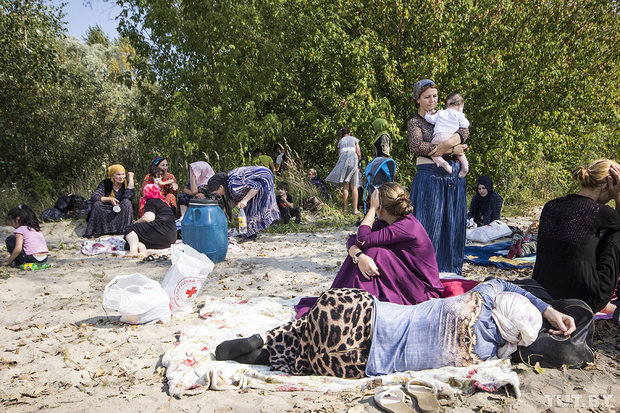
Ramzan Kadyrov Lashes out at Chechens Who Flee Republic
Publication: Eurasia Daily Monitor Volume: 13 Issue: 159
By:

The ruler of Chechnya, Ramzan Kadyrov, has finally reacted to the ongoing scandal related to Chechen refugees stuck in Belarus since the summer (see EDM, September 29). Using his favorite means of public communication, Instagram, Kadyrov dismissed claims that residents of Chechnya have to leave the republic for any reason. People fleeing Chechnya, according to Kadyrov, are not refugees. “Chechnya is the most stable and fast-developing region, and there is no social support as high as in the republic anywhere else, including Europe,” he claimed. As usual, Kadyrov asserted that foreign security services are using Chechen refugees for their own ends. Then, the governor issued a warning to the people fleeing Chechnya, saying that “the way back home will be long and hard!” At the same time, Ramzan Kadyrov exonerated those Chechen refugees who fled the republic at the time of the two Russian-Chechen wars. “Many of them have settled, become scientists, specialists, famous athletes. We are happy for them. They do not forget their homeland, [they] make it famous, [and they] do not commit acts harmful to the image of our nation and republic,” he declared (Instagram.com, September 27).
The story of the Chechen refugees in Belarus developed throughout this past summer and culminated in a protest demonstration at the border. Hundreds of refugees escaping from Chechnya to the European Union have converged on the Belarusian city of Brest, located near the border with Poland. For months, Chechen waves of refugees attempted to cross the border to the Polish city of Terespol, but Polish authorities repeatedly turned them back. Finally, as their desperation rose, several hundred Chechens set up a make-shift camp in an open field to draw attention to their plight from the authorities and international organizations (Tut.by, August 29).
The difficulties experienced by Chechen refugees trying to cross the Belarussian-Polish border date back at least to the summer of 2015. At that time, tensions were also high as Polish authorities turned away many Chechens who were trying to claim refugee status in the country (Tut.by, September 16, 2015). The latest crisis, however, has drawn much greater international attention. Notably, Poland’s government has grown more reluctant to receive additional Chechens on Polish soil, even though many of the Chechen refugees plan to travel on to other EU countries rather than stay in Poland. Since there is no war in Chechnya, the Polish interior ministry said, Chechens are not fearing for their lives and thus should be considered refugees. But at least some Chechen refugees claim that they cannot return to their republic because they fear retribution from the authorities in Chechnya (Onkavkaz.com, September 29).
Ramzan Kadyrov has condemned the media for the attention it has drawn to the problem of Chechen refugees. Moscow, on the other hand, generally appears to be in favor of emigration by people who do not accept modern Russian political and social realities. Specifically, in the North Caucasus, Russian authorities have encouraged the emigration of potential and actual Muslim radicals to the Middle East over the past several years (see EDM, May 28, 2015). Nonetheless, mass emigration of Chechens to Europe is a double-edged sword for the Russian authorities, since it inadvertently portrays Chechnya as an unstable and unlivable region, thus undermining Kadyrov’s claims about the great socio-economic achievements in the republic.
Meanwhile, Chechnya’s governor has continued to raise eyebrows in Russia for his utter disregard for the laws of the country, which certainly adds credibility to the negative stories relayed by Chechens fleeing the republic. On September 27, while appearing on the evening news on Chechen TV, Kadyrov ordered the republic’s police officers to shoot people for driving under the influence. Alcohol is officially outlawed in Chechnya, which has given rise to the spread of other drugs. After the televised broadcast, Kadyrov’s words were redacted from the website of the TV station but remained accessible across social media. Subsequently, Russian opposition newspaper Novaya Gazeta published the report along with the original audio file. The article’s editors published questions addressed to the Russian authorities asking whether, via his remarks, Kadyrov was officially announcing the legalization of capital punishment in Chechnya and whether Chechen police would actually follow these orders and start shooting people for using illegal substances, including alcohol (Novaya Gazeta, October 10). Chechnya’s prosecutor general, Sharapuddi Abdul-Kadyrov, later stated that the governor’s words were misinterpreted. Abdul-Kadyrov said the governor of Chechnya actually meant that substance abusers are often tied to terrorist rings and, therefore, should be killed if they resist the police (Interfax, October 2). Rather than being reassuring, the prosecutor general’s words came off sounding like an implicit endorsement of Kadyrov’s statement.
Capital punishment is not used in Russia; individuals convicted of grave crimes are instead sentenced to life in prison. Ramzan Kadyrov’s incendiary statement on Chechen TV thus illustrates his routine disregard for Russian laws as well as his repressive governance style, which is likely to backfire down the road. Kadyrov appears unable to effectively delegate power or build a system of governance that can take care of society’s needs. Instead, Chechnya’s governor relies on inducing fear to control the republic. Kadyrov’s authoritarianism also indicates that no one outside his inner circle is likely to feel completely safe. Hence, the slow-motion Chechen exodus from the republic is unlikely to halt. And due to persistent anti-Chechen attitudes among ethnic Russians (see EDM, June 15, 2012; January 16, 2014), Chechen refugees will continue to try to leave the Russian Federation.



